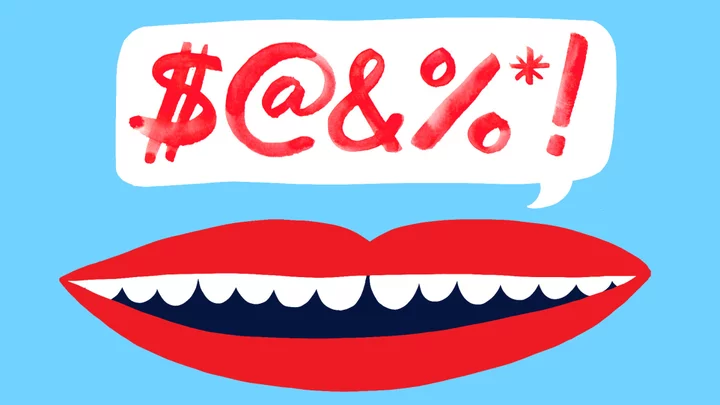As a society, we like to swear.
Swear words have a strange power over us. It starts when we are young, when they are deliciously taboo. Then, as we age, our dependence on swear words increases to the point where as an adult, we find that the magnitude of our emotions can only be captured by cursing.
Yes, many of us have grown attached to swear words, but only a fraction of us actually know where they came from. What old dead languages do we have to thank for some of the best words of all time?
SEE ALSO: Here's proof that 'Finding Dory' is better with a bunch of swearingWe looked into this vital question and are here to report back to you what we have found. We leaned heavily on the Online Etymology Dictionary (OED) for information, in addition to various online dictionaries such as Merriam-Webster, Dictionary.com and the free online Oxford Dictionary. (The internet can teach you things, everyone.)
Credit: Ambar Del Moral / MashableWe have Old English to thank for one of the most commonly used swear words in the United States. Old English words such as scite (dung), scitte (diarrhea), and scitan (to defecate), all rooted in the Proto-Germanic skit-, evolved into Middle English schitte (excrement) and shiten (to defecate). It then evolved some more to the word we know and love today.
According to OED, "shit" has been used to mean an "obnoxious person" since 1508. The dictionary also has a list of common phrases involving "shit" and the approximate year they were first used. Here is some of what they found in their research:
1922: "not give a shit"
1937: "shit-hole"
1942: "shit list"
1960s: "shit-faced"
1989: "same shit different day"
To trace the history of this word, you have to break it down into its component parts first. We know where "shit" comes from, so it's time to explore when "bull" first started to take on more meaning beyond the name for male cattle.
Using "bull" to mean a lie or falsehood can be traced back to the Old French word bole, which means "deception, trick, scheming, intrigue" according to the OED. Bole developed into the Middle English "bull," meaning "false talk, fraud," and was used in the 14th century.
America is credited for making "bullshit" into slang, but the word did exist before it became widely used. Most notably, it was part of the title of an unpublished T.S. Eliot poem called "The Triumph of Bullshit."
Credit: Ambar Del Moral / MashableThe origin of "fuck" is one of the hardest to trace, as it was banned from early written work and dictionaries.
Etymologies from various sources all tend to agree that the word probably developed from various Germanic languages. The verb form of the word in German is ficken. In Dutch, fokken means "to breed or beget." Norwegians have the word fukka, which means "to copulate." Swedish also has focka (to strike, to copulate) and fock (penis).
According to OED, "fuck" did not appear in any English language dictionary from 1795 to 1965. The Penguin Dictionary finally made a bold move to include it in 1966 and from there it was added into other dictionaries.
As with "shit," here are some commonly used "fuck" phrases and the approximate date when it began:
1916: "fuck up"
1929: "fuck off"
1960: "fuck-all"
According to Slate, the Oxford English Dictionary cites the first known instance of "motherfucker" being used in a 1889 Texas trial where a witness stated that the defendant in the case was called "that God damned mother-f--king, bastardly son-of-a-bitch."
World War II was responsible for bringing the word into popular usage, perhaps most famously captured by Kurt Vonnegut's Slaughterhouse-Five, which features a character who basically uses it as every other word in conversation.
SEE ALSO: Netflix drops profanity-filled 'History of Swear Words' trailer with Nicolas Cage Credit: Ambar Del Moral / Mashable"Damn" has gone through a long line of evolutions, starting from the Latin words damnum meaning "damage, hurt, harm; loss, injury; a fine, penalty" and the verb damnare meaning "to adjudge guilty; to doom; to condemn, blame, reject" (OED).
Old French picked it up as damner, a word with a very similar meaning. It then made its way to Middle English as dampen.
In other "damn" related information, "god-damn" was used in the late 14th century, according to OED. It came from the Old French word godon, which was apparently "a term of reproach applied to the English by the French." Salty.
Additionally, the euphemism "dang" was first used around 1780. It's somehow satisfying to know that "damn" came first in our language.
Credit: Ambar Del Moral / MashableIs "crap" still considered a swear word in today's day and age? We get the sense that we've been desensitized to it, that doesn't have the same bite as some of the others on this list. But no matter. Swear word or not, let's take a look at where it comes from.
"Crap" has a basis in farming terminology, of all things. It is thought to have roots in Old Dutch (krappen meaning "to cut off, pluck off") and Medieval Latin (crappa meaning "chaff"). "Chaff" is defined as "the husks of corn or other seed separated by winnowing or threshing."
Old French took the Latin word and turned it into crappe. Middle French saw it as crape, a word meaning "siftings" which does have a tangential relation to chaff in that it indicates a separation process. This made its way to Middle English as crappe, which referred to "grain that was trodden underfoot in a barn, chaff."
As a farming term, "crap" tended to point towards the stuff that was unwanted or discarded. It's no surprise that the word has continued to have that definition as time progressed. In the early 15th century, it was used to reference "weeds growing among corn." In the late 15th century, it was "residue from renderings." Using it to mean "rubbish, nonsense" was first recorded in 1898.
Credit: Ambar Del Moral / Mashable"Asshole" is unfortunately not creation Americans can take credit for.
The word is a derivation of "arsehole," which developed from the Middle English arce-hoole. This in turn was evolved from the Old English earsðerl, which is the Latin anus combined with pyrel ("hole"). According to OED, "asshole" came to mean "contemptible person" in the mid-1930s.
Since we're on the topic, "ass" (when it means backside, not the animal) is also a derivation of "arse," and it was first used as nautical slang in 1860.
UPDATE: Aug. 15, 2023, 1:18 p.m. AEST This article was originally published in Mar. 2017, and has since been updated in Aug. 2023.
Featured Video For You 7 things 'Pulp Fiction' taught us about swearing and more








